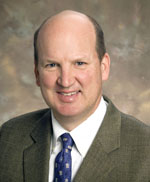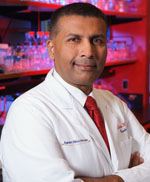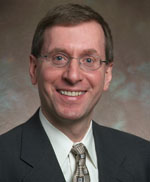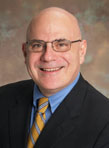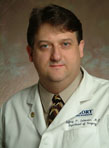 |
||||||||||||||||||
March 2012 |
||||||||||||||||||
Next stepsAs many of you know, I will be stepping down from my post as dean later this year. This is not good-bye. After my successor is on board, I will take a year-long sabbatical and then return to the faculty to continue my dermatology practice, become more involved in teaching, and continue health care advocacy nationally and internationally. I plan to make this transition as smooth as possible, so I have made my departure date somewhat flexible. I gave the date of Aug. 31, but I can adjust that accordingly to when my successor is at the helm. In the past 16 years, you and I have accomplished much together. We have added 1 million square feet to the SOM's facilities, developed a vibrant new medical education curriculum that resulted last year in one of our best residency matches in the school's history, boosted research funding nearly five-fold over the years to now rank 15th in the nation in terms of NIH funding, nearly doubled the size of our faculty, and added six new departments. Our next phase should prove to be every bit as challenging, but the possibilities are endless. A subcommittee of the Emory Board of Trustees has been assembled to advise Wright Caughman, CEO of the Woodruff Health Sciences Center, on organizational structure and the role of the Dean in optimizing the integration of performance across all missions—education, research, and health care. Throughout this process, I have a dedicated team of talented professionals working tirelessly behind the scenes to make this transition seamless. I could not have asked for a better administrative cadre of professionals as my colleagues. Without their capable hands and minds, the SOM would not have remained fiscally viable in this constantly changing health care arena; nor would the school have recruited the talented students, residents, faculty, and staff we have today. We would not have achieved the superb level of research and medical practice that we have enjoyed thus far. I really appreciate having them by my side. If you have any questions about this transition process, as always, please feel free to contact me or a member of my administrative team. Our doors are always open. Almost at the finish line
More than six years ago, the School of Medicine kicked off its Campaign Emory fund-raising goal of $500 million, so I wanted to give you an update as we enter the final stretch of the campaign, which ends in December. Thus far, we have beat our goal by $1.4 million. I would like to thank our more than 32,000 donors—alumni, parents, patients, friends, faculty, staff, foundations, and corporations—who have helped us draw near the university's overall Campaign Emory goal and who help us continue our work to strengthen the School of Medicine. In particular, I'd like to recognize Ada Lee Correll, who chairs the School of Medicine campaign, for her leadership and tireless dedication. As of the close of 2011, 1,469 full- and part-time SOM faculty and staff participated in MyEmory, raising more than $2.14 million for the SOM. A special thanks goes to Andrew Smith, the Baghat/Smith Chair of Heart Failure Therapy and chair of the SOM MyEmory campaign. He carried the torch for MyEmory, and as a result, we increased our participation rate from 22% to 29%. Emory joins heart failure networkThe National Heart, Lung, and Blood Institute (NHLBI) recently selected Emory's Center for Heart Failure Therapy and Transplantation as one of nine centers included in the elite Heart Failure Clinical Research Network. Emory will receive a seven-year, $2.5 million grant to develop clinical trials in heart failure, with additional funding over time to carry out these trials. Javed Butler, professor of medicine (cardiology), is principal investigator.
"This is a tremendous honor for our heart failure program. The centers participating in this research consortium carry out the highest quality clinical research in our field," says Butler, who also is director of heart failure research. "The grant covers a seven-year funding cycle that will give Emory access to many novel studies." The network is a cooperative group of advanced heart failure clinical and research centers. Emory will collaborate with participating centers to develop innovative research and strategies to diagnose, manage, and treat all forms of heart failure. According to Butler, heart failure remains one of the most common high-risk diseases affecting Americans. Approximately 50% of patients die within five years of developing heart failure and once they are hospitalized, patients have a 30% risk of dying within one year. The Emory studies to be included in the network will be determined at steering committee meetings, he says. Behind the scenes at the School of MedicineOver the next few issues of the Dean's Letter, we will be profiling different members of the school's administration team. They are part of the family of faculty, administrators, managers, and employees who make the SOM great, providing oversight of everything that makes the SOM tick, from the finest minutiae to the largest issues we face. We are grateful for their loyal service. Two leaders in this group are Barbara Schroeder and Josh Barwick, who manage our fiduciary and administrative matters, respectively. Schroeder is CFO and executive associate dean for fiscal affairs. Talk with her for a few minutes, and you instantly realize there could not be a more friendly or nicer person as the steward of the SOM's $700 million of expenditures through 6,300 projects in 28 academic departments and 20 additional units and offices. She has worked at Emory since 1995 and has been at her current position for 11 years.
Schroeder oversees the school's annual budgeting process, provides long-term strategic financial planning, implements and maintains effective internal fiscal controls, serves as the financial interface with Emory Healthcare, Grady, Children's Healthcare of Atlanta, and the Atlanta VA Medical Center—as well as all of the central university offices. She handles many administrative and operational issues that arise in such a large medical school, too. All of this is possible with the support of the small, dedicated staff members in the office of business and finance, which is led by Sharen Olson, associate dean, whom Schroeder calls her "right hand." Tens of thousands of transactions pass through their hands and are reviewed and approved annually. Other team members include Pat Davis, director of research business and finance, who provides support and guidance to departments with pre- and post-award research activities, and Constance Nagle, assistant dean for business and finance, who oversees fiscal and operational activities related to Grady. Call her capable and erudite—she has an undergraduate degree from Brown and a graduate degree from Harvard—but she is definitely down-to-earth. She is married to an engineer who shares in the equally demanding responsibilities of raising their 11-year-old daughter. The family enjoys time off in the summer in their cabin in northern Wisconsin kayaking and relaxing, free from TV, Internet, and phone service. Schroeder also enjoys cross-stitching, "which suits my need for attention to detail but which has no known deadline." Barwick, associate dean for administration, has broad responsibility for day-to-day functioning of key administrative processes and is SOM liaison to Emory's Office of General Counsel. In this role, he directs business, legal, and regulatory matters, such as review of institutional agreements between the SOM and its clinical and educational affiliates, partners, and outside organizations. Barwick's team includes the employees who handle faculty appointments and promotions and faculty HR matters (with Jane Crosta, director of faculty administration), manage staff HR issues (with Cliff Teague, director of staff HR), and process legal agreements (with Shelly Ziegler, assistant director, contracts). Barwick also enjoys working closely on faculty matters with Sharon Weiss, associate dean for faculty affairs, and on issues related to conflict of interest with Helen McLaughlin, assistant dean for administration. He is responsible for many other tasks, including managing dean's office review of faculty grievances, researching misconduct allegations and compliance issues, providing administrative support to twice-monthly meetings of the dean and all chairs, and performing special projects and other administrative functions.
Prominent in Barwick's personality is his easy-going manner. He has found his niche working side-by-side with SOM's other leaders. "It's a privilege to work with such knowledgeable and accomplished leaders as Claudia Adkison [former executive associate dean] and Tom Lawley," says Barwick. "I've learned so much from them. I value being able to work with great people at all levels of the SOM and collaborating on projects with other schools and units throughout the university. There is a real culture of collegiality and professionalism among Emory's leadership, faculty, and staff, something that newly recruited employees often comment on." There is no surprise that this accomplished attorney with a variety of degrees from across the globe—a bachelors degree from Cornell, a juris doctorate from Syracuse University, and a master's in health economics and administration from Ben Gurion University in Israel—is an amateur anthropologist who speaks several languages. But many are unaware that he is a dedicated volunteer with those seeking refuge and opportunity in the United States, and he is working currently with refugees from Bhutan who are ethnic Nepalese. Spotlight on SurgeryWith nearly $11.7 million in research funding, the Department of Surgery was ranked fifth among other such departments in the nation for NIH awards in 2011, according to findings from the Blue Ridge Institute for Medical Research. "We have remained in this position for the past four years," says Chris Larsen, Joseph Brown Whitehead Professor and Chair. "The department continues to sustain its remarkable growth in research activities, despite the fact that federal funding is leveling off and foundation and philanthropic support has declined. Our outstanding faculty and staff are what make these types of achievements possible." Larsen and Allan Kirk, vice chair of research, were two of the top five U.S. principal investigators for funding listed in this report. Total research funding for the department in FY2011 was $27.586 million. The department's growth is seen in the following accomplishments from the past year:
Recent awards and honors
Tim Buchman (surgery and anesthesiology) was inducted into the Johns Hopkins Society of Scholars and was one of 20 research physicians to be named among the American College of Critical Care Medicine's first class of Master of Critical Care Medicine Fellows. Max Cooper (pathology and laboratory medicine) is the recipient of the 2012 Dean's Distinguished Faculty Lecture Award. His lecture is scheduled for April 19 at 5 p.m. Rishi Gupta (neurology) was recognized by the American Stroke Association for having one of the three highest-rated research abstracts at its international conference. His abstract, "CT Perfusion Increases Time to Reperfusion and May Not Enhance Patient Selection for Endovascular Reperfusion Therapies in Acute Ischemic Stroke," was one of 1,500 submitted. Albert Losken (plastic and reconstructive surgery) was named to the William G. Hamm Chair in Plastic Surgery. His research interests include body contouring following weight loss and development of more effective educational tools for plastic surgery. Rebecca Pentz (hematology and medical oncology) was named chair of the ethics commission of the Atlanta Board of Education. Her research focus is empirical ethics research on such issues as informed consent, phase 1 research, and genetic confidentiality, as well as helping researchers with their protocols to make them ethically sound. Jeffrey Salomone (trauma/surgical critical care) was appointed president of the Eastern Association for the Surgery of Trauma, the nation's largest trauma surgery society. Stanley Sherman (medicine) was elected chair of the board of directors of the Medical Association of Georgia. He also serves as editor-in-chief for the Journal of the Medical Association of Georgia. The School of Medicine earned an "A" from the American Medical Student Association on its PharmFree Scorecard. | ||||||||||||||||||
 |
||||||||||||||||||

